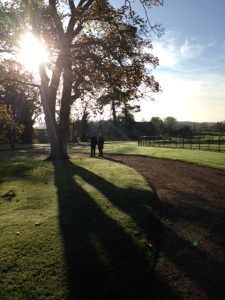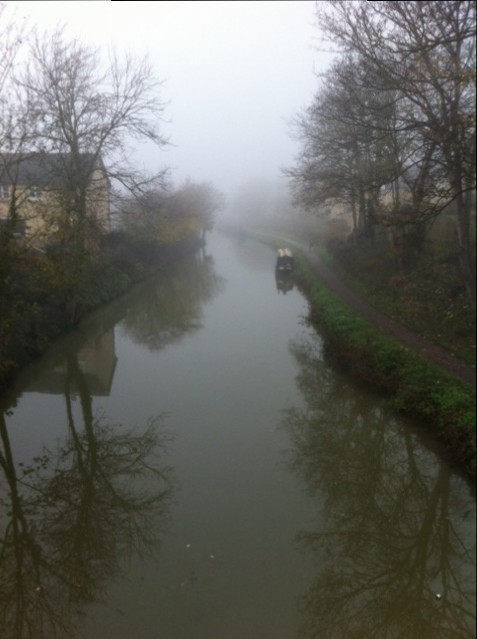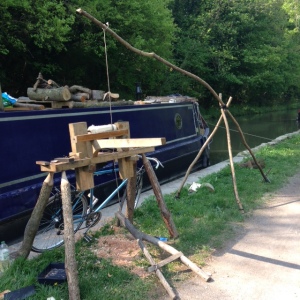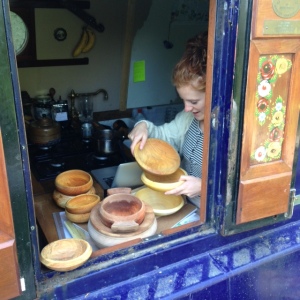When I was on the Aldeburgh Eight Advanced Poetry Seminar at Bruisyard Hall last November with seven other poets, I was encouraged to go for a walk every morning at nine o’clock. When I say ‘encouraged’ I mean that the eight of us, in pairs, whatever the weather, were turfed out of the house for a thirty minute walk across fields and country lanes, talking about our poetry and/or our lives (we were given a topic to talk about but I seem to remember much meandering and deviation, literally and figuratively) then it was back to Bruisyard Hall for a quick coffee/loo break before we seated ourselves around an enormous dining table for a morning of workshops with Peter Sansom and Jackie Wills.

Stanford study finds walking improves creativity
Creative thinking improves while a person is walking and shortly thereafter,
I didn’t need to be persuaded about the benefits of a daily walk, it’s something I’ve long tried to incorporate into my routine although, I must admit, I don’t always manage it and, when I do, it’s almost never at the same time each day. But I won’t be the only person to have found that a knotted poem has unravelled itself during a gentle walk or an opening line has appeared in my head like a gift. Even if there wasn’t a study from Stanford University proving that walking improves creativity, I’d still be a fan of a daily ramble. It lifts my mood, helps me sleep better and I sometimes – often – see interesting sights.
Only the other day, while walking with my husband along the Kennet and Avon Canal, we spotted this hand-built lathe next to a narrowboat called ‘Blewit’.
I asked permission to take a photograph although I forgot to ask the names of the people living in the boat.
It seems ingenious to me, to be able to build something out of natural materials found alongside your home, and the bowls that the woodturner makes are beautiful.
I wouldn’t say finding a hand-built lathe gave me inspiration for a new poem but it did stop me in my tracks and make me realise that life doesn’t always need to be complicated. And it reminded me of how beautiful simplicity can be.
What, as a writer, can I learn from a hand-built lathe?
- to use the materials you find in front of you
- to keep working (even the smallest completed bowl takes several hours)
- you will make mistakes (which you might be able to turn them into something else)
- you might make something you like
- you might even be proud of it
- other people might find what you’ve made beautiful or useful or both
- other people might want what you’ve made
- other people might learn from what you’ve made
- other people might love what you’ve made
OK, I don’t think there’s quite enough material here to start a new philosophical movement but the point is I would never have seen the lathe at all, would I, if I hadn’t been out on a walk?
What are you thoughts? Are you a fan of walking? Do you find it helps your creativity? Is it part of your routine? And what kinds of sights do you come across on your walking journey? Have you ever built your own lathe? Do let me know!




I am a big fan of walking and running although the latter is out of reach at the moment. It is great for creativity as I often get the germ of an idea from other’s actions (e.g. I have a poem about a hen party). But I am very envious of creatives who make things, whether a painting or wooden bowl, and I’m sure that helps in creating more ephemeral art for those lucky enough to have both skills.
LikeLiked by 1 person
Writers ‘make’ too, Peter but I know what you mean. I’ve written two plays which have been produced (one on radio, one on stage) but I can’t hold them in my hands, the way I can hold my poetry pamphlet. As I’m typing this reply to you, I can hear Andrew’s electric saw buzzing from the shed at the bottom of our garden – he’s making a piece of trellis for our front fence. He makes things all the time but he’s never ‘made’ a poem. Lovely of you to respond to my post, thank you! x
LikeLiked by 1 person
Walking is always essential to me – I can’t write much without it. Being sent out in pairs would horrify me though – I need to walk alone and in silence.
LikeLiked by 2 people
Luckily they were a wonderful group and we also had time later in the day to be alone. I know exactly what you mean, though. When I walk with my family I often disappear into my own thoughts and my family love me well enough to leave me be. Thanks for commenting, Angela! xx
LikeLiked by 1 person
Walking was essential to W.H. Davies, the ‘tramp poet’. Even with only one foot.
LikeLiked by 2 people
Thanks, Nell. I’m dropping this link here because I’d never heard of him – although I discover now that as a schoolchild I learnt by heart his ‘What is this life if full of care….’ poem. So THAT’S who he was. https://en.wikipedia.org/wiki/W._H._Davies
LikeLike
Yes to walking, though as I get more decrepit, the walks are short and wobbly. My problem nowadays is that I tend to forget the fabulous lines that come to me in my rambles, and I can’t handle two sticks and a notebook!
Pole lathes are still used in the woods around High Wycombe, and probably millions of chair legs were made there in the past.
LikeLiked by 2 people
Yes, I also feel frustrated when a brilliant idea strikes during the night and then has disappeared by morning. I know some people use a phone and record ideas this way. Lovely to hear about the pole lathes (ah, so that’s the term for them!) in High Wycombe. 🙂
LikeLiked by 1 person
I do find walking very helpful for creativity, and I’ve written a lot about it critically too, but I’m interested what they would do if faced with a less able-bodied poet? It has struck me before that the intensiveness of the seminar must be a physical barrier to many poets. This morning regime seems to come from the best intentions, but is another indicator of how entrenched in ableism a lot of thinking about the process of poetry is, and how unintentionally excluding that can then be.
LikeLike
Please don’t interpret my flippant remark about “turfing people out” as Poetry Trust policy, Polly! I found the Trust to be an organisation which took inclusion seriously. All venues were fully accessible, for example, and individual needs were always considered. (I won’t go into detail here but we were asked about physical and medical needs before the seminar started, for example). Our age range was from 25 to 67 and were all able-bodied. The morning walk was something we were encouraged to participate in at our own pace. If there is any ableism here it’s in the thoughtless wording of my post, and I apologise for that. Thanks for your thoughts.
LikeLike
I enjoy walking too. In fact I’m off on a three day walking holiday next weekend in the Isle of Wight. Sometimes I find I have to write things down, yet that’s an added bonus. For me it is just wonderful to be outside and away from the laptop! My aim to eventually complete the Thames Path walk. Now done all but one ‘London’ section. I’m beginning to find walks nearer to me which I didn’t know about because I live in a built up area with busy main roads. I love seeking out new hidden pathways, the ones not so many know about. It does me the world of good. When I’m writing fiction I try to visit the place my story is set to get a feel for it. Again, I get drawn in by everything about those places, the history and the green spaces.
LikeLiked by 1 person
This all sounds quite wonderful, Heather! I agree that time away from the laptop is extremely refreshing. Best wishes with your walking and your writing 🙂
LikeLike